Nestled in the backyards of homes, kitchen gardens—often known as backyard gardens—serve as intimate, small-scale havens for growing an enchanting array of vegetables, herbs, fruits, and occasionally even flowers. With a focus on nourishing families, these gardens gift households with fresh, wholesome, and often organic produce, infusing daily meals with the essence of a balanced and healthy diet.
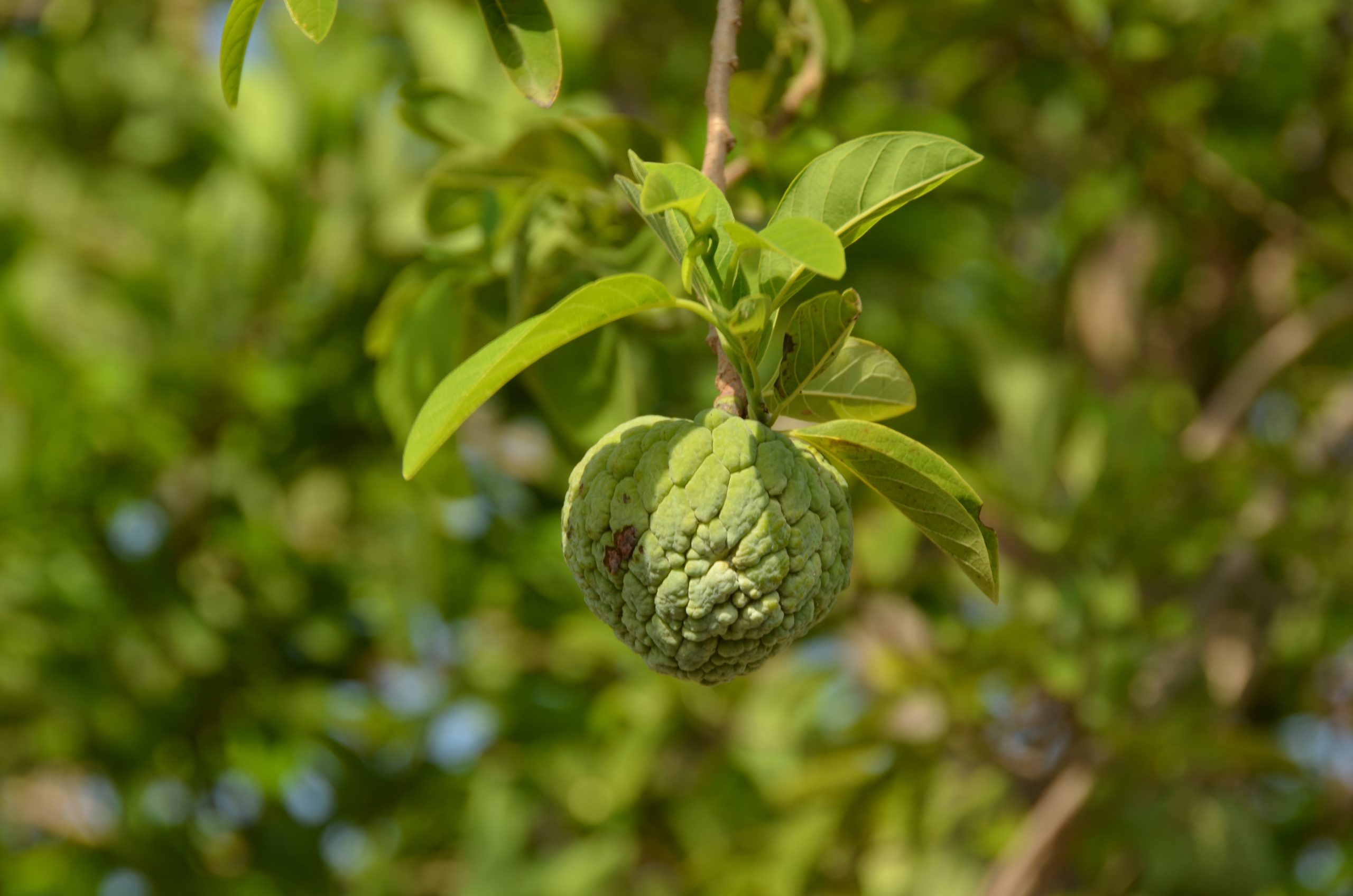
Beyond providing sustenance, these gardens also act as a beacon of food security, ensuring a continuous supply of vegetables and fruits. At times, the surplus from these gardens allows families to sell them at local markets and earn an additional income. These sustainable, eco-friendly gardens require minimal technical expertise to create and maintain.
In Pandurna Block, Chhindwara District, Madhya Pradesh, eight pioneering villages have now embraced a transformative approach by converting their backyard kitchen gardens into flourishing semi-commercial vegetable production units. This remarkable metamorphosis was made possible through WOTR’s ingenious Mandap Vidhi method, a technique that optimizes garden space and resources.
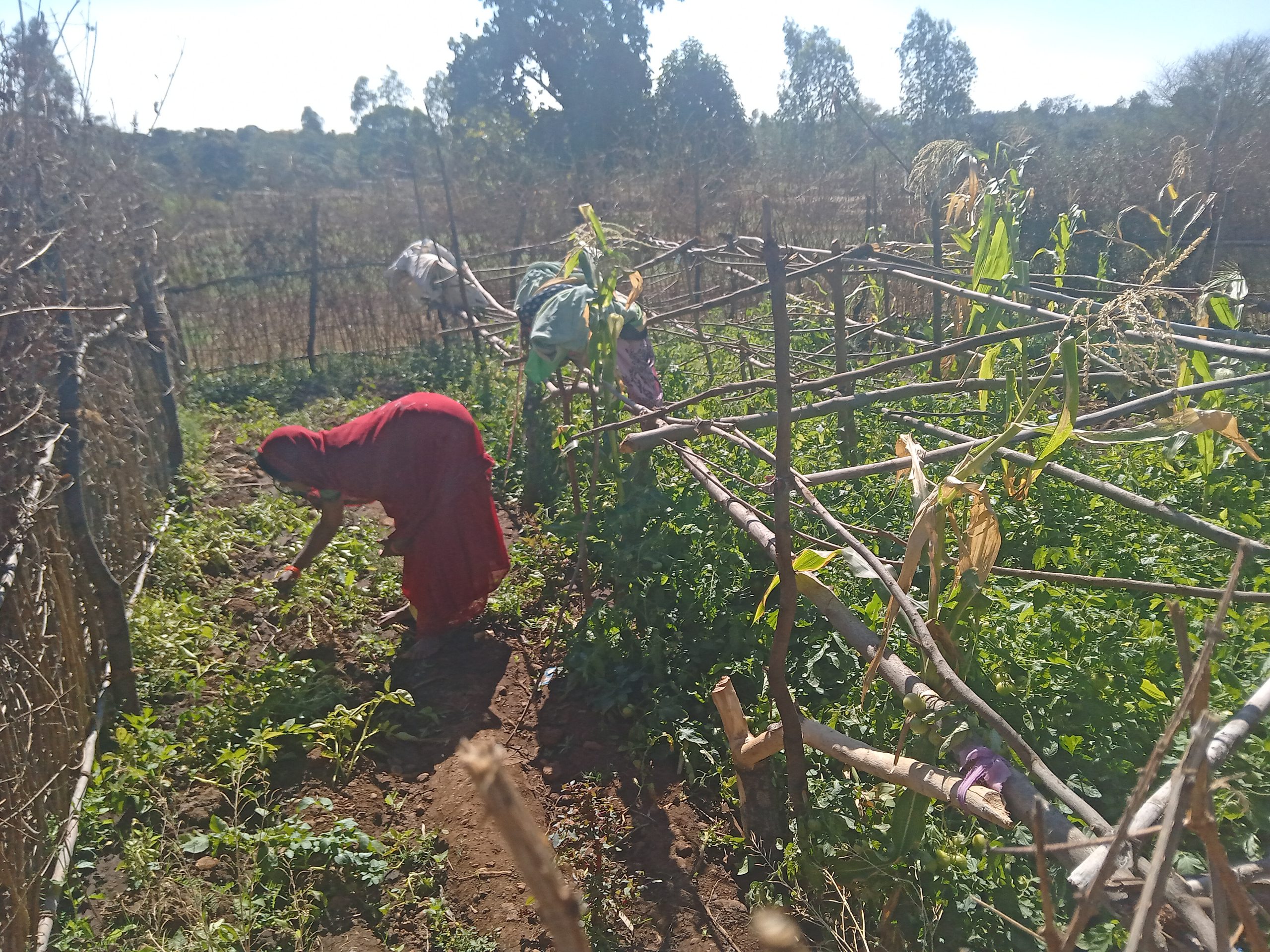
What began as a humble initiative to address food and nutrition needs has blossomed into a life-changing opportunity for numerous families, empowering them to generate income and secure food during trying times, such as the COVID-19 pandemic. This inspiring activity, a testament to resilience and adaptability, was brought to life through the HDFC Bank CSR Parivartan’s Holistic Rural Development Programme (HRDP).
From Badis to Mandap Vidhis
Within the eight villages, several residents had already been tending to small backyard gardens, popularly known as “Badis” in the local parlance. However, these gardens offered only a limited assortment of vegetables, such as potatoes, tomatoes, and chilies, which primarily made up the villagers’ daily diet. Furthermore, climbing plants and vines sprawled across the ground, monopolizing valuable space and resources in these modest gardens.
When the WOTR implemented project unveiled the idea of ‘Kitchen Gardens‘, its fundamental objective was to enhance the nutritional well-being of small and marginal farmers and their families by offering them a diverse array of vegetables throughout a significant portion of the year. To amplify their food production capabilities, the innovative Mandap Vidhi method was introduced, which ingeniously maximizes the utilization of limited space and resources. This method facilitates the efficient cultivation of a variety of vegetables, ultimately fostering a more balanced and nourishing diet for the households that embrace it.
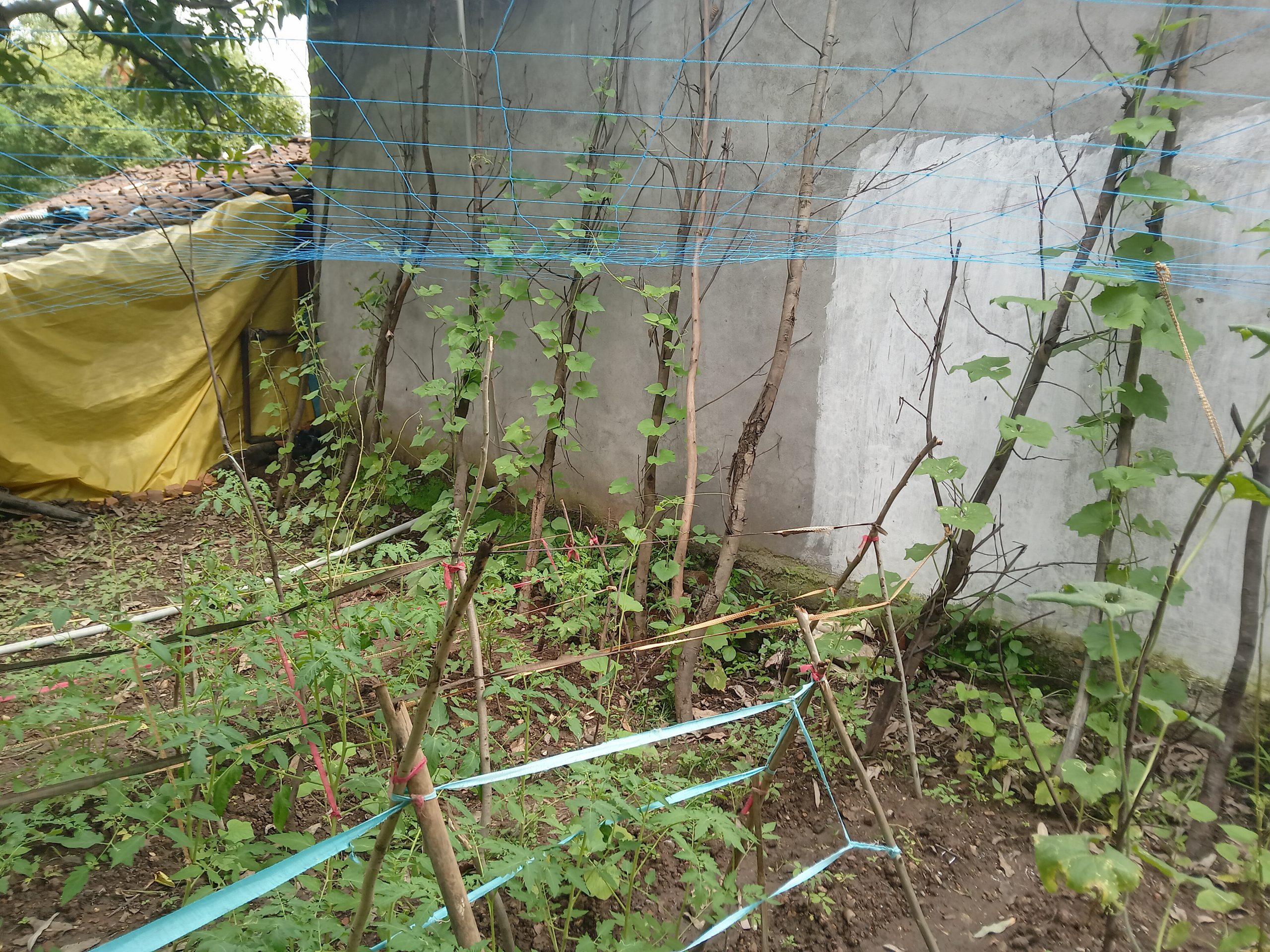
By harnessing the Mandap Vidhi method, climbing and vine vegetable plants flourish atop the mandap, while root vegetables, tubers, and smaller plants find a nurturing home beneath it. This resourceful technique is particularly favourable for shade-loving vegetables and boasts minimal irrigation requirements, making it an exemplary solution for those with scarce water resources.
Remarkably, even wastewater from kitchens or bathrooms can be repurposed to sustain these gardens. Throughout the arid summer months, vegetables continue to thrive in a mandap, undeterred by the limited water availability. Recognizing these numerous advantages, an increasing number of families have embraced the Mandap Vidhi method, broadening the assortment of vegetables they cultivate and generating additional income by selling surplus produce at local markets.
Lalita Bai from the village of Karaghat Kamithi recounts her journey: “Our humble badi used to yield merely a handful of vegetables, limited to our daily staples like potatoes, tomatoes, and chilies. We lacked the space to grow a diverse array of vegetables. We collected seeds from our village, scattering them without a plan, and let climbing and vine plants grow untamed on the ground. We made do with our modest kitchen garden’s offerings, reserving the purchase of additional vegetables from weekly markets for special occasions, such as festivals. The significance of a healthy and nutritious diet eluded us.”
“Then, our lives were transformed when the project staff introduced us to the revolutionary Mandap Vidhi method for cultivating kitchen gardens. With their expert guidance, we constructed a proper mandap, which dramatically enhanced our vegetable harvest.”

“In the past, our attempts to gather vegetables often led to damaged or broken produce due to poor growth. However, with the Mandap Vidhi method, harvesting vegetables became effortless, with no breakage. Most thrilling of all, we cultivated a diverse and abundant selection of vegetables, including cucumbers, ladyfingers, and bitter gourds.”
“During the daunting COVID-19 lockdown, when my husband was unemployed, I relied on the vegetables from our garden. Fuelled by determination and resourcefulness, I sold our produce, earning approximately 5,000 Rs. This eye-opening experience revealed the potential of selling surplus produce in local markets. Now, I regularly contribute to our household income, using the earnings to help cover expenses. Our lives have been irrevocably changed, and our family’s well-being has significantly improved, all thanks to our thriving garden and the innovative mandap vidhi method.”
Benefits derived from the Mandap Vidhi method
The Mandap Vidhi method offers a host of benefits to the rural community in the eight villages of Pandhurna. These include:
-
Food Security and Nutrition
The kitchen gardens directly address issues of nutrition and food security by providing a steady supply of vegetables for participating families, helping build their immunity during times of crisis, such as the COVID-19 pandemic.
-
Empowerment of Women
The project actively engages women in the development of kitchen gardens, ensuring food and nutritional security for their families. As a result, women’s contributions to household food security have significantly increased, and kitchen gardens have elevated women’s social status and heightened their awareness of the importance of a nutritious diet for their families. For some, selling garden produce at local markets has become a noteworthy source of income.
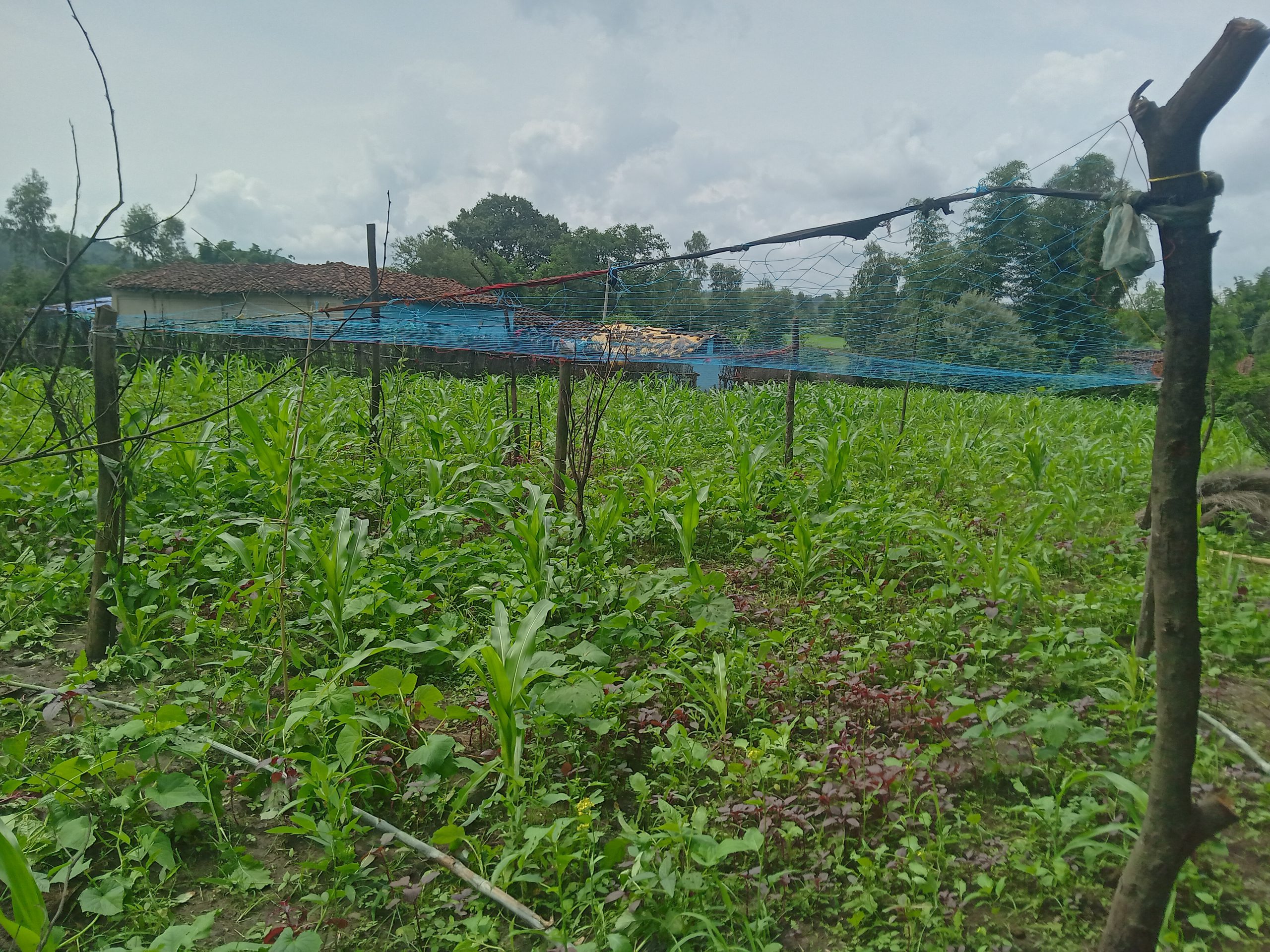
Kitchen gardens also present an excellent option for pregnant women, who should avoid heavy manual labour or long hours without sufficient food intake to ensure the safety of both mother and child. By investing time in kitchen gardening, women can generate some income and provide nutrient-rich garden products that ensure food and nutritional security for their growing children.
-
Environmental Benefits and Sustainability
With a focus on sustainability and eco-friendliness, kitchen gardens serve as an opportunity for waste disposal through composting and water conservation through the reuse of wastewater for irrigation. The gardens are a testament to the resilience and adaptability of these communities in times of crisis, ensuring food and nutrition security while providing an alternate source of income.
-
Replicability and Expansion
The success of this initiative has led to its replication in other villages. Efforts have been made to link farmers to the market through convergence with gram panchayats and other community-based organizations. This expansion highlights the potential for a broader impact as more households embrace the semi-commercial vegetable production units.
Cultivating a Sustainable Future
The transformation of backyard kitchen gardens into semi-commercial vegetable production units demonstrates the power of grassroots initiatives, women’s empowerment, and sustainable practices in creating a positive and lasting impact on rural communities.
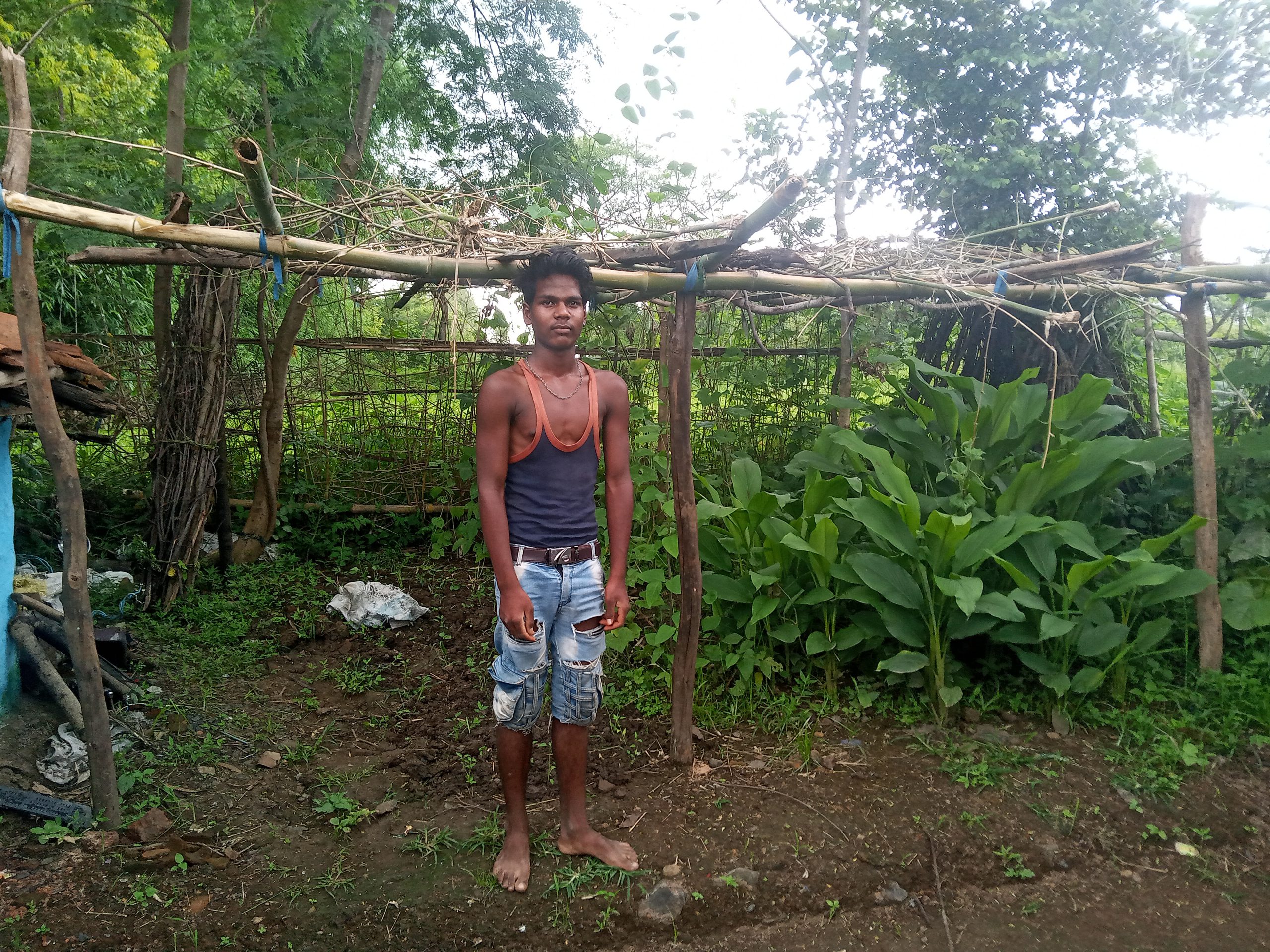
As more families adopt these practices, the green revolution in these villages will continue to flourish, nurturing not just the gardens but also the lives of those who tend to them while ensuring food security and improved nutrition for all. With 580 direct beneficiaries and 53 indirect beneficiaries to date, the project’s impact has been significant and continues to grow as more households embrace these semi-commercial vegetable production units. The Mandap Vidhi model serves as an inspiration for other communities seeking to enhance food security, nutrition, and sustainable livelihoods.





